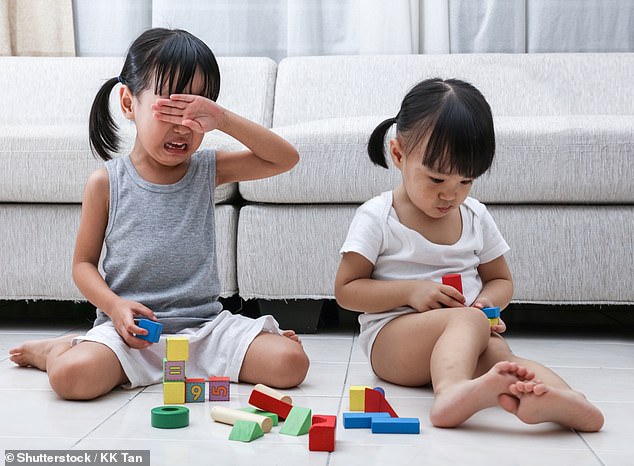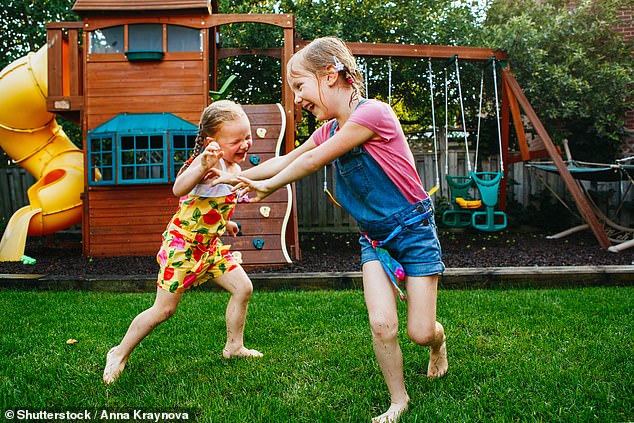Have you ever told your child that they have to finish their meal or they can’t get dessert?
Have you ever forced a kid to say sorry after they hurt another child? Or called a youngster naughty if they misbehaved?
Well, according to a woman who has worked in childcare for over a decade, these parenting practices, while common, are actually extremely damaging to children.
Esther Allen, 33, based in the UK, has a degree in early childhood education and has been a full-time nanny for 14 years, taking care of kids of all ages from newborn to 13.
The expert spoke exclusively with the Daily Mail about the often-used methods by moms and dads that she believes are detrimental for youngsters.
She also broke down what parents should do instead so they can ensure they are giving their son or daughter the best childhood possible and fostering a healthy environment for them to grow.
Here are the common parenting techniques that Esther, a childcare worker of 14 years, thinks moms and dads should avoid at all costs.

Esther Allen, 33, based in the UK, shared the common parenting practices that are actually extremely damaging to children
Expecting young kids to say sorry
Esther explained that a young child ‘doesn’t have the emotional development’ or ’empathy’ to feel truly sorry, so insisting they apologize if they misbehave could be counter productive.
‘[It] just teaches them that by saying that word, everything is okay,’ she explained.
‘[Say] they hit another child, say sorry, and move on, [they’ll] probably go back and hit again.’
Instead, she said that if a child hits another under her watch, she has them check if the other child is okay.
‘Then [I have them] ask that child if they’d like a hug, high five, or maybe see if they’d like a particular toy to cheer them up,’ she added.
‘That way the child learns that if they hurt someone then they need to fix it by checking on the other child and seeing if there is anything they can do to make it better, versus just saying sorry.’
Insisting children finish the food on their plate
Esther said she always ‘leaves it up to the child to decide how much they eat and what they eat,’ and advised against forcing a youngster to finish all the food on their plate.
She explained that insisting they eat could backfire and make them resent the process, resulting in more picky eating down the road.
And according to the childcare expert, toddlers going through a fussy stage when it comes to food is totally normal, so it’s best not to fret if they skip a meal.
‘I serve the children I nanny a healthy, nutritious meal, with always at least one food on their plate I know they like and will eat,’ she shared.

Esther said she always ‘leaves it up to the child to decide how much they eat and what they eat,’ and advised against forcing a youngster to finish all the food on their plate (stock image)
‘Then I leave it up to the child to decide how much they eat, and what they eat. If they take one bite of the pasta and say they are done, that’s fine.
‘I never insist or encourage the child to eat more. Typically, most toddlers will go through a fussy stage with eating, some days barely eating, then other days eating more than you think possible.
‘But often when you look at how much they eat over a week it tends to even out, even if some days it feels like they are living off air.
‘Generally speaking, neurotypical children will not starve themselves.’
In addition, if a child is refusing to eat something, Esther said you shouldn’t offer them something else for dinner.
‘All this will do is reinforce any sort of picky or fussy eating and you may find yourself stuck in a cycle of serving dinner, child refuses, and you have to make something else,’ she added.
Labeling children as naughty

Almost every parent is guilty of calling their child ‘naughty’ if they act out, but according to Esther, you should never use that word to describe your son or daughter (stock image)
Almost every parent is guilty of calling their child ‘naughty’ if they act out, but according to Esther, you should never use that word to describe your son or daughter.
In fact, she said you should never give a child any label for that matter.
‘Children aren’t naughty, sometimes their behavior can be. But the child itself – never,’ she stressed.
‘Children often become the label they hear being used of them, labeling a child as naughty, shy or messy – they often internalize it, and become what is expected of them from that label.’
She explained that children who ‘act out’ are often just ‘overwhelmed, disregulated, hungry, tired or seeking connection,’ so it’s best to take a moment to try to figure out what might be causing them to misbehave.
‘Every behavior has a reason behind it. Often it is a case of stepping back and trying to asses the situation and find out the route cause of the behavior,’ she said.
‘Finding the cause often is better than reacting behavior itself. However it’s important that boundaries and limits are also put in place and these are consistent – otherwise this can also cause more behavioral issues.
‘[If] all else fails, get them outside – sometimes just a change of scenery, and the space to swing, climb, or run free can make the world of difference.’
Forcing children to share their toys

Most parents believe that teaching their kids to share with others is a vital lesson, but Esther believes it’s actually not good for them (stock image)
Most parents believe that teaching their kids to share with others is a vital lesson, but Esther believes it’s actually not good for them.
She advised against forcing a child to share with someone else if they’re in the middle of using a toy.
‘When a child is playing with a toy, they are busy, working, exploring, being creative, imaginative and often in their own world,’ she explained.
‘If another child comes along, demands said toy and the parent hands it over to the other child, what message does that tell the child that was playing?
‘The other child’s demands are more important than their play? Or that whatever they have they have to share?
‘I always allow children to play with a toy for as long as they want – if a sibling or friend wants a turn, then they have to wait until they are finished.’
Rushing to help children with something without letting them try first
The nanny also pointed out that many parents rush to do stuff for their kids without even letting them try to do it on their own first.
She said most kids are a lot more capable than their parents think, and stressed the importance of letting them give things a go so they can learn to be independent and do it on their own.

Esther has a degree in early childhood education and has been a full-time nanny for 14 years, taking care of kids of all ages from newborn to 13
‘Even very young children are extremely capable. Often when they set their mind to a task, no matter how hard or sometimes impossible for them to do, they can be very determined to try their hardest,’ she shared.
‘If it’s a task I know they can do, or are clearly showing an interest at having a go – such as getting dressed – then I give them the time and space to try first rather than stepping in to help just because it might be quicker or I think they can’t do it.’
Allowing screen time for young children
Esther said she never lets children under two have screen time, and kids that are aged two to five only get 30 minutes a day max under her watch.
She pointed out that overuse of electronics has ‘been linked to developmental delays and behavioral problems.’
‘Screens can cause more sibling arguments and meltdowns, poor sleep habits, shorter attention spans, and problems with eating if screens are used at mealtimes,’ she shared.
‘And children are struggling to simply play without an adult or a screen. I know screens make things 10 times easier in the moment, but at what cost?’
Not giving kids enough free time

Lastly, Esther said she believes parents are micromanaging their kids’ time way too much, and she stressed the importance of letting them have free time to play on their own (stock image)
Lastly, Esther said she believes parents are micromanaging their kids’ time way too much.
She stressed the importance of letting them have free time to play on their own.
‘I believe parents are entertaining their children too much, playing with their toys, filling their days with outings, play dates, screen time, doing crafts, and playing together,’ she said.
‘It is of course important to spend time with children, connecting, bonding, and doing things enjoyable together.
‘But it is also vital for their development that for a good chunk of the day they spend freely playing without any adult involvement or guidance.’












